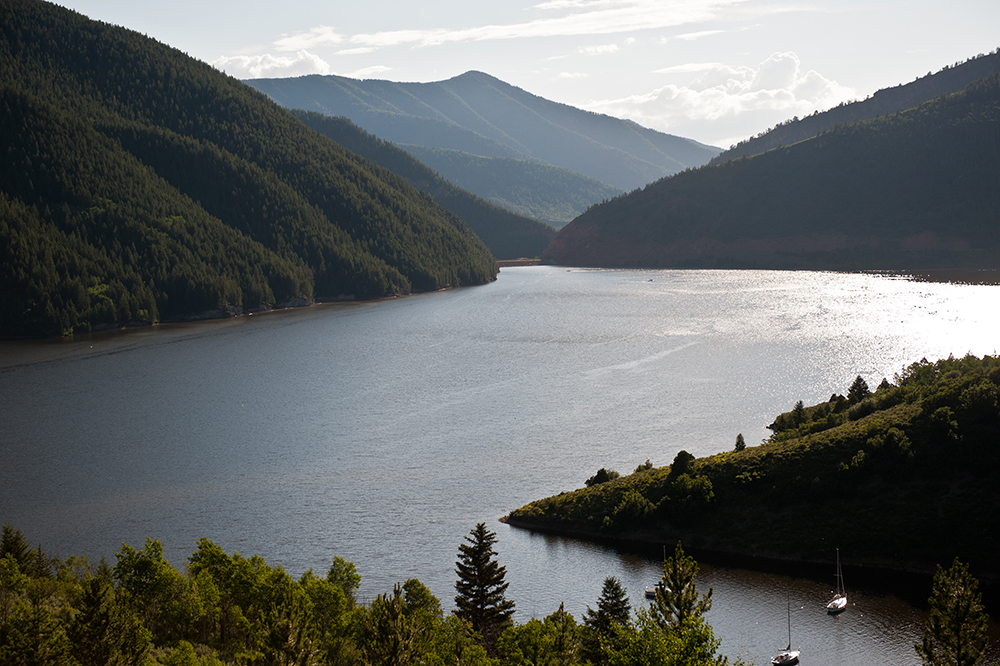Reclamation
>
News & Multimedia
>
news release
>
Reclamation funds local watershed projects in Montana, Oklahoma and Idaho
news release ARCHIVE
 The Cooperative Watershed Management Program contributes to the WaterSMART strategy by providing funding to watershed groups to encourage diverse stakeholders to form local solutions to address their water management needs.
Return to top
The Cooperative Watershed Management Program contributes to the WaterSMART strategy by providing funding to watershed groups to encourage diverse stakeholders to form local solutions to address their water management needs.
Return to top
Reclamation funds local watershed projects in Montana, Oklahoma and Idaho
Media Contact:
Peter Soeth, 303-445-3615, psoeth@usbr.gov
For Release: Aug 8, 2019
 The Cooperative Watershed Management Program contributes to the WaterSMART strategy by providing funding to watershed groups to encourage diverse stakeholders to form local solutions to address their water management needs.
The Cooperative Watershed Management Program contributes to the WaterSMART strategy by providing funding to watershed groups to encourage diverse stakeholders to form local solutions to address their water management needs.
WASHINGTON — The Bureau of Reclamation will provide a total of $331,792 to three groups who will undertake collaborative, on-the-ground watershed management projects. The funding will help address critical water supply needs, water quality concerns, restoration needs, meet competing demands and avoid conflicts over water. The Reclamation funding will be leveraged to support $1.2 million in watershed management improvements.
"Collaboration is key to addressing critical water supply needs," said Reclamation Commissioner Brenda Burman. "Tackling on-the-ground projects in partnership with local communities will help ensure that these watersheds remain healthy and productive into the future."
Under this funding opportunity, applicants can request up to $300,000 in Reclamation funding and must contribute a non-Federal cost-share of 50% of total project costs. The three projects selected are:
To learn more about the Cooperative Watershed Management Program or view detailed information about the projects selected, please visit www.usbr.gov/watersmart/cwmp/.
Through WaterSMART, Reclamation works cooperatively with states, tribes, and local entities as they plan and implement actions to increase water supply reliability through investments to modernize existing infrastructure and attention to local water conflicts. Visit www.usbr.gov/watersmart to learn more.
"Collaboration is key to addressing critical water supply needs," said Reclamation Commissioner Brenda Burman. "Tackling on-the-ground projects in partnership with local communities will help ensure that these watersheds remain healthy and productive into the future."
Under this funding opportunity, applicants can request up to $300,000 in Reclamation funding and must contribute a non-Federal cost-share of 50% of total project costs. The three projects selected are:
- Lower French Creek Sediment Reduction, Big Hole Watershed Committee (Montana) - The Big Hole Watershed Committee based in Divide, Montana, will receive $86,610 to complete the Lower French Creek Sediment Reduction Project. It was developed in partnership with the Montana Department of Fish, Wildlife and Parks. The project will reroute a 4,000 linear foot reach of French Creek that is currently pinned between an eroding bank and linear gravel piles, leading to an annual deposition of an estimated 800 tons of sediment into French Creek. This will improve the river’s flow and will create important habitat for fish and other aquatic creatures.
- Implementation of the Lake of the Arbuckles Watershed Restoration Plan, Lake of the Arbuckles Watershed Association, Inc. (Oklahoma) - The Lake of the Arbuckles Watershed Association based in Sulphur, Oklahoma, will receive $89,000 to implement best management practices with the Lake of the Arbuckles watershed. This will result in water quality and quantity improvement for the basin and the entire community.
- Middle Snake River Tributary Sedimentation and Phosphorus Ponds, Southern Idaho Water Quality Coalition (Idaho) - The Southern Idaho Water Quality Coalition based in Twin Falls, Idaho, will receive $156,182 to construct a series of sediment and phosphorus removal ponds on the O Coulee Canal and the Auger Falls Lateral 43 Canal. The project is expected to prevent approximately 1,150 tons of sediment and 2,385 pounds of phosphorus from entering the Snake River annually and will help the Twin Falls Canal company meet their reduction requirement under the Snake River Total Maximum Load Management Plan. This will improve water quality for the Snake River.
To learn more about the Cooperative Watershed Management Program or view detailed information about the projects selected, please visit www.usbr.gov/watersmart/cwmp/.
Through WaterSMART, Reclamation works cooperatively with states, tribes, and local entities as they plan and implement actions to increase water supply reliability through investments to modernize existing infrastructure and attention to local water conflicts. Visit www.usbr.gov/watersmart to learn more.

